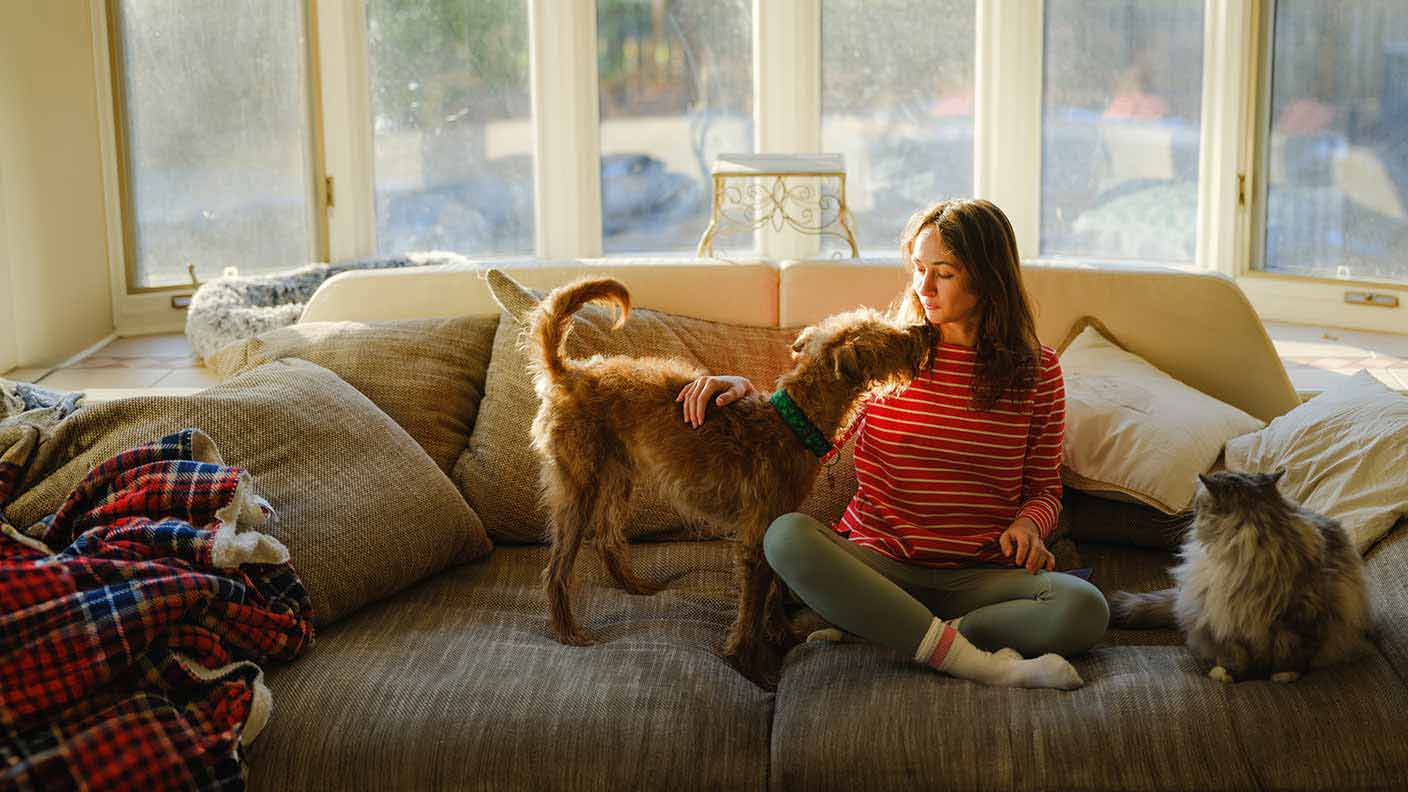Is rehoming a dog right for me?
Owning a dog can change your world, but when things don’t work out rehoming is sometimes the only option. It can be difficult to give up your dog, but it means they get a chance at a new home. For many people, when they decide to get a dog, they’ll visit an animal shelter to find their new pet.
Don’t chase your tail, learn everything you need to know about rehoming a pet without the panic. Discover our top tips and things to think about with this guide to rehoming a dog. Learn more with Sainsbury’s Bank today.
Why would an owner rehome their dog?
Giving up a dog for adoption or rehoming can happen for a range of reasons and circumstances. Happy and healthy dogs can require lots of time, money, and exercise. Sometimes people need to rehome a pet due to the economy, a change of job, a new home, or even illnesses.
Giving up a dog for adoption
In a 2022 RSPCA article, it was revealed that the number of pets successfully rehomed had dropped by 8%, and the number of pets taken in by shelters had increased by 8.4%. As of 2022, the Dogs Trust have received a record number of enquiries for people rehoming their dog.
The top three reasons given to Dogs Trust by owners thinking about giving up their dog are:
24%. Unwilling or unable to cope with owning a dog.
23%. The dog was showing unwanted behaviours.
17%. Said their circumstances had changed.
Owners giving up their dogs for adoption aren’t the only challenges facing adoption centres. Many animals arrive from stray pounds or rescue charities.
If a shelter has kennel space free, they may be able to take your dog straight away. It’s worth contacting an organisation just to confirm what their process is for giving up your dog.
What do animal shelters do? Where can I find one?
Animal shelters look after dogs and pets with an aim to rehome.
There are many dog rehoming organisations around the UK. Look online to find your ideal dog rehoming centre. Whether that’s giving up your dog or giving a pup a new home.
While there are many local institutions, some larger ones include:
The experts at a shelter may be able to tell you where the dogs in their care came from. They’ll also be able to discuss the characteristics of the dog’s behaviour.
When dogs are brought to a shelter, they’re given a behavioural and temperament assessment. This helps to determine the personality of each dog and can uncover any problems they might have, as well as any underlying causes.
There is no standard check. The techniques used can range from seeing how the dog reacts when brought into contact with other animals, to placing it with a foster family for a time.
How do I adopt a rehomed dog or pet?
Shelters usually have a website with details of dogs waiting to be rehomed, often listed by breed. This is handy if there’s a breed you want to adopt. They can also include details of each dog’s behavioural assessment.
When you take a dog home, some shelters might ask you for a fee. To get an idea of costs, Battersea Dogs & Cats Home has a rehoming fee (that’s a new owner taking a dog home) of £175 for dogs or £250 for pups.
The fee is to help cover the costs of looking after the dog while it was in their care.
These costs could include:
• Vaccinations
• Neutering
• Health tests
• Microchipping
• Flea treatments
• Worming
• A collar and lead
What kind of things will shelters ask me?
Shelters have ways to ensure both the dog and prospective owner are a good match. Usually, this means some time filling in forms before you find your fluffy friend for life.
Here are some questions you might expect:
- How many adults live at your address?
- What are their professions and working hours?
- Does anyone there suffer from asthma?
- How would you describe your home? e.g. a flat, a bungalow
- Do you own your home or is it rented?
- If it is rented, can you provide evidence that pets are allowed?
- Do you have a garden?
- If so, is it private or shared?
- If you have a garden, is it securely fenced?
- Is everyone in your family keen to adopt a dog?
- In the next few months, are you planning to:
- Move home?
- Change your working hours?
- Have a baby?
These questions let the shelter ensure the dog is moving into a stable home it can thrive in.
In their own words, the Dogs Trust explains this, stating:
“Our rehoming team will go through a questionnaire, designed to help us find out more about you, your lifestyle and the home you can provide so we can see which dogs you may be perfect for.
We often find that when you visit, the dog chooses you and not the other way around, so grab a coffee and take your time. If you don’t find a dog on the first visit, you can pop in as many times as you like until you do.
We also find that people come in with an idea of the dog they want and end up with something completely different. Whatever happens, our brilliant teams have rehomed hundreds of thousands of dogs over the years and know just the perfect fit.”
Are there any reasons I can’t adopt a dog?
Some places won’t give a dog to someone under the age of 18 or 21, so make sure you read their requirements thoroughly. Each shelter is different, so it is best to speak to someone there if you have any questions.
The adoption process can also involve a home visit from a representative to ensure that a potential new pooch will be happy there. They can also offer advice on any changes or improvements to the home if it’s deemed unsuitable for a rehomed puppy or dog.
In some instances, health or lifestyle choices could detract from your ability to adopt a dog.
Other considerations when rehoming a dog
You’ll want to take any other pets you have into consideration. Reputable shelters should discuss any potential issues with you and help you find a dog with the right temperament to suit your situation.
Try to think about any issues, commitments, or wants you have, and how that may affect the dog.
What about allergies?
Allergies can cause problems. There are many breeds that may be more compatible with those who tend to sneeze and get watery eyes when furry friends come near. There may be medication to help you too.
Smaller dogs with thicker coats may shed less dander (dry skin cells, which is where many allergens are found) than other dogs, so it might be worth keeping that in mind.
There are other ways to control your allergy symptoms, such as keeping your bedroom pet-free and having hardwood floors instead of carpets, as these can trap dander in the pile.
Grooming your dog outside rather than indoors can also help lower allergen levels in your home.
How does a dog feel when rehomed?
A lot of people wonder how a dog feels when rehomed, and that’s natural. Giving up a dog, especially when you don’t want to, can be stressful for both pet and owner. It’s difficult, but not cruel to rehome a dog.
Separation is tricky, after all, dogs are a man’s best friend. That means dogs are incredibly affectionate and naturally build strong bonds. It also means a rehomed puppy or pooch may struggle to adapt to a new environment. It’s okay though, in the right environment and with lots of care, pooches can learn to love and trust again. They may cry, whine, or be nervous at first and usually there’s an adjustment period. But don’t worry, with the right love and care their tails will be wagging in no time.
Taking your dog home
Rehomed pets come with their own needs, different from those bought from a breeder. Depending on their background, adoptions may need support with issues to make them comfortable. They may even have triggers due to abuse, or traumatic circumstances. If your dog was purchased from a shelter, they should be able to advise on any behaviours.
Before you take your dog home, it’s important to create a pet friendly home for them. Be prepared, and consider if you can deliver the atmosphere and training they require.
Approaching a dog for the first time
Remember, even if you found the perfect furry friend, they don’t know you yet. These tips will help make it more likely your first meeting is a happy one.
• Keep calm. Give the dog space – walking parallel to them is good approach.
• Keep it low-key. Don’t over-excite them or encourage them to jump up.
• Watch your body language. Don’t bend down to the dog or put your face too close to them. Stay standing at a respectful distance.
• Give them agency. Allow the dogs to come to you rather than approaching them, and prepare to be guided by instructions from the handler.
Returning a dog
It always feels bad, but sometimes things don’t work out between new pets and owners. Even if every care is taken to match you with a dog that fits in with your lifestyle and environment.
If this happens to you, speaking to your shelter can support you in figuring out your next move.
If things feel dire – even if you love your rehomed puppy – contact your shelter.
Insuring your rehomed dog
The process for taking out pet insurance for a rehomed dog is as easy as for one from a breeder.
Insurance policies tend to be available for dogs that are over eight weeks old. For some breeds, the age limits vary so be sure to check.
Have a look at our guide to pet insurance made simple for more information.
A new life together
The rewards of rehoming a dog are numerous. There’s the satisfaction of helping a pooch in need, to a sense of fulfilment as your new friend flourishes in your care.
Choosing to take in a dog from a shelter can result in a new family member that provides you with joy and gratification, as well as unconditional love.
Information to help you care for your dog
Owning a dog can be very rewarding for you and your family. Our handy guides are bursting with tips to help you build a close bond with your dog and keep them safe and healthy.

Our guide hub
Explore our guides

Get ready for a new dog
Tips to help you get off to a great start

Dog breeds explained
Information on different types of dog
Frequently asked questions
Should I visit my dog after rehoming?
It’s not recommended to visit a dog after rehoming, as it can be distressing for both parties.
Do dogs remember you if you rehome them?
Yes, when you rehome a puppy or dog they can remember you. When you give up your dog, they’ll miss you. But don’t worry, dogs live in the moment, and they’ll find joy again.
How long is a dog rehoming process?
Dog rehoming can take months, if you include the time, it may take for them to settle. On average, they remain with an adoption centre for just over a month before being rehomed.
Have you got any questions?
There’s lots to think about when it comes to owning a dog. Our FAQs have answers to all the most common questions we get asked that might help you.
Are you ready to buy pet insurance?
If you’re happy our pet insurance provides the cover you need, you can buy a policy online today.
Terms and conditions
Important information
Sainsbury's Bank plc, Registered Office, 33 Charterhouse Street, London, EC1M 6HA (registered in England and Wales, no 3279730) is authorised by the Prudential Regulation Authority and regulated by the Financial Conduct Authority and the Prudential Regulation Authority (register no. 184514).
Sainsbury's Supermarkets Ltd is an appointed representative of Sainsbury's Bank plc. Sainsbury's Bank plc acts as an introducer to Pinnacle Insurance Ltd who is authorised by the Prudential Regulation Authority and regulated by the Financial Conduct Authority and the Prudential Regulation Authority (register number 110866). Registered office: 4th Floor, Limelight, Elstree Way, Borehamwood, Hertfordshire, WD6 1JH. Sainsbury’s Bank Pet Insurance is arranged, administered and underwritten by Pinnacle Insurance Ltd. Sainsbury's Bank plc and Pinnacle Insurance Ltd are not part of the same corporate group.
We do not provide personal recommendations to customers.
